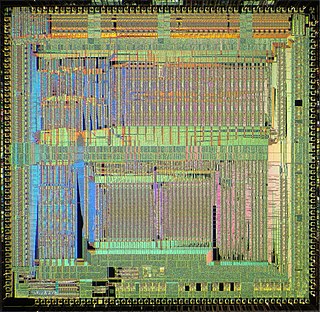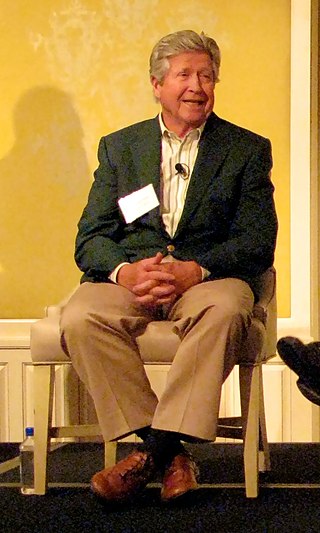
PMC-Sierra was a global fabless semiconductor company with offices worldwide that developed and sold semiconductor devices into the storage, communications, optical networking, printing, and embedded computing marketplaces.

Bipolar Integrated Technology, Inc. (BIT), later Bit, Inc., was a privately held semiconductor company based in Beaverton, Oregon, which sold products implemented with emitter-coupled logic technology. The company was founded in 1983 by former Floating Point Systems, Intel, and Tektronix engineers. The company, which occupied a 46,000-square-foot manufacturing facility at the Oregon Graduate Center, raised $36 million in start-up capital within three years of its foundation.

A mixed-signal integrated circuit is any integrated circuit that has both analog circuits and digital circuits on a single semiconductor die. Their usage has grown dramatically with the increased use of cell phones, telecommunications, portable electronics, and automobiles with electronics and digital sensors.
A load-balanced switch is a switch architecture which guarantees 100% throughput with no central arbitration at all, at the cost of sending each packet across the crossbar twice. Load-balanced switches are a subject of research for large routers scaled past the point of practical central arbitration.
VLSI Technology, Inc., was an American company that designed and manufactured custom and semi-custom integrated circuits (ICs). The company was based in Silicon Valley, with headquarters at 1109 McKay Drive in San Jose. Along with LSI Logic, VLSI Technology defined the leading edge of the application-specific integrated circuit (ASIC) business, which accelerated the push of powerful embedded systems into affordable products.
A Wavefront arbiter is a circuit used to make decisions which control the crossbar of a high capacity switch fabric in parallel. It was commercialized in the TT1 and TTx chip sets designed by Abrizio and sold by PMC-Sierra.

Donald Thomas Valentine was an American venture capitalist who concentrated mainly on technology companies in the United States. As the founder of Sequoia Capital, he has been referred to as the "grandfather of Silicon Valley venture capital". The Computer History Museum credited him as playing "a key role in the formation of a number of industries such as semiconductors, personal computers, personal computer software, digital entertainment and networking."

Nicholas (Nick) William McKeown FREng, is a Senior Fellow at Intel, a professor in the Electrical Engineering and Computer Science departments at Stanford University, and a visiting professor at Oxford University. He has also started technology companies in Silicon Valley.
Adisak Mekkittikul received his B.Eng. from King Mongkut's Institute of Technology Ladkrabang in Thailand and M.S. in electrical engineering from Wichita State University. He completed the Ph.D. degree in electrical engineering at Stanford University, Stanford, California in 1999, after defending dissertation titled "Scheduling Non-Uniform Traffic in High Speed Packet Switchers and Routers" which he wrote while being mentored by Nicholas William McKeown. He was a Senior Member of Technical Staff at Berkeley Concept Research Corp.
Stream Processors, Inc. (SPI), was a Silicon Valley-based fabless semiconductor company specializing in the design and manufacture of high-performance digital signal processors for applications including video surveillance, multi-function printer]s and video conferencing. The company ceased operations in 2009.
Virtual output queueing (VOQ) is a technique used in certain network switch architectures where, rather than keeping all traffic in a single queue, separate queues are maintained for each possible output location. It addresses a common problem known as head-of-line blocking.
Afara Websystems Inc. was a Sunnyvale, California, USA server company whose goal was to build servers surrounding a custom high-throughput CPU architecture, "developing IP traffic management systems that will bring quality-of-service to the next generation of IP access infrastructure." The word "Afara" means "bridge" in the West African Yoruba language.
The R2000 is a 32-bit microprocessor chip set developed by MIPS Computer Systems that implemented the MIPS I instruction set architecture (ISA). Introduced in January 1986, it was the first commercial implementation of the MIPS architecture and the first commercial RISC processor available to all companies. The R2000 competed with Digital Equipment Corporation (DEC) VAX minicomputers and with Motorola 68000 and Intel Corporation 80386 microprocessors. R2000 users included Ardent Computer, DEC, Silicon Graphics, Northern Telecom and MIPS's own Unix workstations.
Integrated Telecom Technology, Inc., known as "IgT" was a fabless semiconductor company founded in 1991 by Ken Lee, Greg Werth, Imran Chaudhri, Jerry Tall, and Chi Wai in Gaithersburg, Maryland. IgT was one of the first companies to focus on semiconductors for the communications marketplace. At its peak, IgT had 60 employees, 45 in its headquarters in Gaithersburg, Maryland and 15 in the San Jose, California office. IgT's logo showed an idealized waveform of a T1 signal.

Mellanox Technologies Ltd. was an Israeli-American multinational supplier of computer networking products based on InfiniBand and Ethernet technology. Mellanox offered adapters, switches, software, cables and silicon for markets including high-performance computing, data centers, cloud computing, computer data storage and financial services.
Vitesse Semiconductor was a fabless American semiconductor company based in Camarillo, California, which developed high-performance Ethernet integrated circuits solutions for Carrier, Enterprise networks. On March 18, 2015, Microsemi Corporation and Vitesse Semiconductor Corporation jointly announced that Microsemi would acquire Vitesse. The acquisition closed on April 28, 2015.

Tabula, Inc., was an American fabless semiconductor company based in Santa Clara, California. Founded in 2003 by Steve Teig, it raised $215 million in venture funding. The company designed and built three dimensional field programmable gate arrays and ranked third on the Wall Street Journal's annual "Next Big Thing" list in 2012.
Barefoot Networks is a computer networking company headquartered in Santa Clara, California. The company designs and produces programmable network switch silicon, systems and software. The company was acquired by Intel in 2019.






